Malcolm R. Campbell's Blog, page 230
September 26, 2012
Sharing the News and Wisdom
“Similarly, the impulse to keep to yourself what you have learned is not only shameful, it is destructive. Anything you do not give freely and abundantly becomes lost to you. You open your safe and find ashes.” - Annie Dillard, The Writing Life
Now, this may sound like pseudoscience, but it appears that when we share information, the universe of that information suddenly becomes larger not only for others but for ourselves as well. It's certainly true with secrets. Most of us find that out the hard way. It takes us longer to learn that telling everything else we know doesn't decrease our wealth, knowledge, spirituality or sense of self, it expands it.
Sometimes I despair, though, when I see how much of today's social media, "news" and conversation is tied up with sharing information that harms or degrades others in some way. Topless pictures of royalty, tell-all books, shocking stories about love affairs, and lies about political candidates of both major parties often dominate out consciousness. To what end?
But news that helps others, makes them smile, gives them ideas for their hobbies and careers, and brings transformational moments, now that is what I'd like to see a few more headlines and Tweets about. Telling what's good seems to bring us even more good to tell. It's infinite wealth.
Today's Writing Links
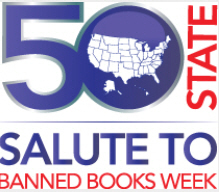 News: Banned Books Week Celebrates Its 30th Anniversary - “The following year [1982] a coalition of organizations concerned with the freedoms of speech and of the press declared a Banned Books Week. Now ASJA's First Amendment Committee is proud to support the thirtieth anniversary of Banned Books Week.” American Society of Authors and Journalists Feature: Does Social Media Sell Books? by Meghan Ward - “The $64,000 question when it comes to social media is: Does it sell books? Many authors have written blog posts attempting to answer this question, and the consensus seems to be that yes, done right, social media does sell books, but in modest quantities.” Writerland Contest: William Van Dyke Short Story Prize at Ruminate Magazine, entry fee $15, prize $1000, 5500 words or less, deadline Oct 26, 2012 Satire: Robin Redbreast Banned from Alton Butts Elementary in Time for Banned Books Week, by Jock Stewart – “The Albino County Board of Education announced here today that Robin Redbreast has been banned from the Alton Butts Elementary School library prior to the Banned Books Week deadline of September 30.” Morning Satirical News
News: Banned Books Week Celebrates Its 30th Anniversary - “The following year [1982] a coalition of organizations concerned with the freedoms of speech and of the press declared a Banned Books Week. Now ASJA's First Amendment Committee is proud to support the thirtieth anniversary of Banned Books Week.” American Society of Authors and Journalists Feature: Does Social Media Sell Books? by Meghan Ward - “The $64,000 question when it comes to social media is: Does it sell books? Many authors have written blog posts attempting to answer this question, and the consensus seems to be that yes, done right, social media does sell books, but in modest quantities.” Writerland Contest: William Van Dyke Short Story Prize at Ruminate Magazine, entry fee $15, prize $1000, 5500 words or less, deadline Oct 26, 2012 Satire: Robin Redbreast Banned from Alton Butts Elementary in Time for Banned Books Week, by Jock Stewart – “The Albino County Board of Education announced here today that Robin Redbreast has been banned from the Alton Butts Elementary School library prior to the Banned Books Week deadline of September 30.” Morning Satirical News


Now, this may sound like pseudoscience, but it appears that when we share information, the universe of that information suddenly becomes larger not only for others but for ourselves as well. It's certainly true with secrets. Most of us find that out the hard way. It takes us longer to learn that telling everything else we know doesn't decrease our wealth, knowledge, spirituality or sense of self, it expands it.
Sometimes I despair, though, when I see how much of today's social media, "news" and conversation is tied up with sharing information that harms or degrades others in some way. Topless pictures of royalty, tell-all books, shocking stories about love affairs, and lies about political candidates of both major parties often dominate out consciousness. To what end?
But news that helps others, makes them smile, gives them ideas for their hobbies and careers, and brings transformational moments, now that is what I'd like to see a few more headlines and Tweets about. Telling what's good seems to bring us even more good to tell. It's infinite wealth.
Today's Writing Links
 News: Banned Books Week Celebrates Its 30th Anniversary - “The following year [1982] a coalition of organizations concerned with the freedoms of speech and of the press declared a Banned Books Week. Now ASJA's First Amendment Committee is proud to support the thirtieth anniversary of Banned Books Week.” American Society of Authors and Journalists Feature: Does Social Media Sell Books? by Meghan Ward - “The $64,000 question when it comes to social media is: Does it sell books? Many authors have written blog posts attempting to answer this question, and the consensus seems to be that yes, done right, social media does sell books, but in modest quantities.” Writerland Contest: William Van Dyke Short Story Prize at Ruminate Magazine, entry fee $15, prize $1000, 5500 words or less, deadline Oct 26, 2012 Satire: Robin Redbreast Banned from Alton Butts Elementary in Time for Banned Books Week, by Jock Stewart – “The Albino County Board of Education announced here today that Robin Redbreast has been banned from the Alton Butts Elementary School library prior to the Banned Books Week deadline of September 30.” Morning Satirical News
News: Banned Books Week Celebrates Its 30th Anniversary - “The following year [1982] a coalition of organizations concerned with the freedoms of speech and of the press declared a Banned Books Week. Now ASJA's First Amendment Committee is proud to support the thirtieth anniversary of Banned Books Week.” American Society of Authors and Journalists Feature: Does Social Media Sell Books? by Meghan Ward - “The $64,000 question when it comes to social media is: Does it sell books? Many authors have written blog posts attempting to answer this question, and the consensus seems to be that yes, done right, social media does sell books, but in modest quantities.” Writerland Contest: William Van Dyke Short Story Prize at Ruminate Magazine, entry fee $15, prize $1000, 5500 words or less, deadline Oct 26, 2012 Satire: Robin Redbreast Banned from Alton Butts Elementary in Time for Banned Books Week, by Jock Stewart – “The Albino County Board of Education announced here today that Robin Redbreast has been banned from the Alton Butts Elementary School library prior to the Banned Books Week deadline of September 30.” Morning Satirical News

Published on September 26, 2012 11:37
September 25, 2012
Writing Links for Monday, September 25
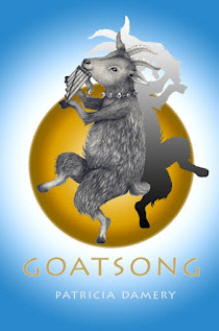 News: -
News: -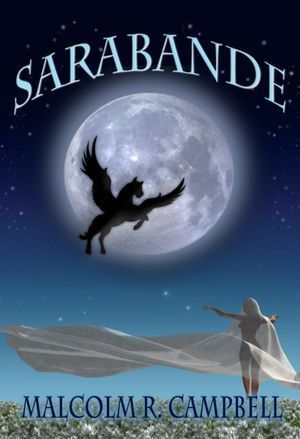 Today's writing links are brought to you by the contemporary fantasy novel "Sarabande," a story about a young woman who bends time and space to rid herself of a ghost. This is a woman's journey story by Malcolm R. Campbell, author of "The Sun Singer."
Today's writing links are brought to you by the contemporary fantasy novel "Sarabande," a story about a young woman who bends time and space to rid herself of a ghost. This is a woman's journey story by Malcolm R. Campbell, author of "The Sun Singer."
Published on September 25, 2012 13:36
September 23, 2012
Writing Links for September 23
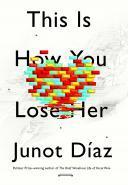 LISTS: PW Picks: The Best New Books for the Week of September 24, 2012, By Gabe Habash for Publishers Weekly – “This week: a soon-to-be classic coming-of-age story, hanging out in the morgue, and a spooky book in the vein of Shirley Jackson. Plus: the story of the richest woman in America.”NEWS: Sequel to King's novel "The Shining" due out in September 2013 – “More than three decades after "The Shining" was first published, the sequel to Stephen King's classic horror novel is finally coming out next year.” - ReutersFEATURE: Building a book collection, one treasured volume at a time, By Michael Dirda – “The other day a friend casually remarked that most of the books in what might be called my library—if I had a much bigger house—probably came to me as freebies. I answered that that wasn’t true at all, that perhaps 10 percent had originated as review copies.” – American ScholarDISCUSSION: Mother Tongue: A New Moveable Feast, by Terri Windling – “The Mythic Arts blogging community is hereby initiating a new Moveable Feast, "Mother Tongue," on the entwined subjects of land, language, art, and storytelling. The list of posts on this subject so far is over on the Moveable Feast page...and everyone is welcome to join in.” – The Drawing BoardINTERVIEW: Junot Díaz with Alden Mudge – “’Prizes are wonderful,’” Díaz says. ‘They sell your books, they get you invited to places you would never be invited. I would never give mine back. But I know them fundamentally for what they are. They’re just today’s applause. They have no bearing on whether a piece of art or an artist will exist into the future. I’m more preoccupied with that. And I think that preoccupation frees your art in lots of ways.’” – BookPage
LISTS: PW Picks: The Best New Books for the Week of September 24, 2012, By Gabe Habash for Publishers Weekly – “This week: a soon-to-be classic coming-of-age story, hanging out in the morgue, and a spooky book in the vein of Shirley Jackson. Plus: the story of the richest woman in America.”NEWS: Sequel to King's novel "The Shining" due out in September 2013 – “More than three decades after "The Shining" was first published, the sequel to Stephen King's classic horror novel is finally coming out next year.” - ReutersFEATURE: Building a book collection, one treasured volume at a time, By Michael Dirda – “The other day a friend casually remarked that most of the books in what might be called my library—if I had a much bigger house—probably came to me as freebies. I answered that that wasn’t true at all, that perhaps 10 percent had originated as review copies.” – American ScholarDISCUSSION: Mother Tongue: A New Moveable Feast, by Terri Windling – “The Mythic Arts blogging community is hereby initiating a new Moveable Feast, "Mother Tongue," on the entwined subjects of land, language, art, and storytelling. The list of posts on this subject so far is over on the Moveable Feast page...and everyone is welcome to join in.” – The Drawing BoardINTERVIEW: Junot Díaz with Alden Mudge – “’Prizes are wonderful,’” Díaz says. ‘They sell your books, they get you invited to places you would never be invited. I would never give mine back. But I know them fundamentally for what they are. They’re just today’s applause. They have no bearing on whether a piece of art or an artist will exist into the future. I’m more preoccupied with that. And I think that preoccupation frees your art in lots of ways.’” – BookPage
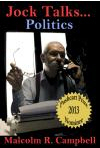
Today's writer's links are brought to you by Jock Talks...Politics, an e-book collection of biting satire that has been nominated for a 2013 Pushcart Prize. The book carries the following warning: Use of this volume while drunk has not been authorized by the Bureau of Alcohol, Tobacco, Firearms and Explosives. It's available on Kindle for only 99 cents.
Published on September 23, 2012 07:31
September 22, 2012
Burning Bridges Before You Cross Them
“There is always the temptation in life to diddle around making itsy-bitsy friends and meals and journeys for years on end. It is all so self conscience, so apparently moral...But I won't have it. The world is wilder than that in all directions, more dangerous...more extravagant and bright. We are...raising tomatoes when we should be raising Cain, or Lazarus.” -- Annie Dillard
An old friend of mine used to always say, "Life is, at best, boring."
I don't agree, though I can see why some people might think so. They dream of doing great deeds and experiencing great loves, yet they diddle around, as Annie Dillard says, with small things.
Those who diddle around must believe the risks of great deeds and loves are simply too high. They look at my wont to stir up trouble and they say, "Look at you. You burned most of your bridges before you got across them."
That's true, but they made glorious fires.
As a writer, I loved those fires. I also loved the consequences: getting wet while swimming across all those rivers. Now that is a living life as a story. I do not understand those who demand exciting fiction, but who settle for so much less in their day-to-day jobs and avocations.
Life is too precious to be summed up with a yawn.
--Malcolm
Malcolm R. Campbell is the author of the contemporary fantasies "The Sun Singer" and "Sarabande" as well as the Pushcart nominated satire "Jock Talks...Politics."

An old friend of mine used to always say, "Life is, at best, boring."
I don't agree, though I can see why some people might think so. They dream of doing great deeds and experiencing great loves, yet they diddle around, as Annie Dillard says, with small things.
Those who diddle around must believe the risks of great deeds and loves are simply too high. They look at my wont to stir up trouble and they say, "Look at you. You burned most of your bridges before you got across them."
That's true, but they made glorious fires.
As a writer, I loved those fires. I also loved the consequences: getting wet while swimming across all those rivers. Now that is a living life as a story. I do not understand those who demand exciting fiction, but who settle for so much less in their day-to-day jobs and avocations.
Life is too precious to be summed up with a yawn.
--Malcolm
Malcolm R. Campbell is the author of the contemporary fantasies "The Sun Singer" and "Sarabande" as well as the Pushcart nominated satire "Jock Talks...Politics."
Published on September 22, 2012 08:58
September 20, 2012
Writer's Links for Thursday
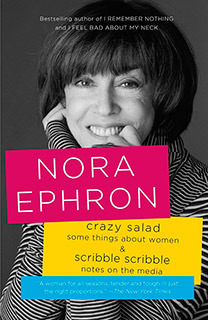 Allowing a story to happen, by Malolm R. Campbell – take a break and relax between scenes rather than forcing the wordsAuthor Elmore Leonard wins prestigious book award, by Mike Householder – “For a man who built his career on word economy, the title is pretty darned long — The National Book Foundation's Medal for Distinguished Contribution to American Letters.”Two out-of-print Nora Ephron titles to be published as a single volume, by by Stephan Lee – “Crazy Salad and Scribble, Scribble have been out-of-print as solo volumes since 1991 and 1984, respectively. Vintage will be giving these two landmark books a fresh printing as a single volume come Oct. 16.”Could Norway’s Publishing Model Work in the United States?, by Jason Boog for GalleyCat – “In an essay about international publishing models at Stanford’s Arcade, novelist and scholar Lee Konstantinou outlined how the government of Norway helps writers.”The Best Kurt Vonnegut Book (Readers’ Pick), Gabe Habash for PWxyz – “Last week, using the hashtag #bestvonnegut we asked our extremely well-read Twitter followers what their favorite Kurt Vonnegut book is, and they responded in a big way. The winner is…”The Curse of First-Person Narration, by Beth Hill for The Editor’s Blog – “Did you know that stories with first-person narration face a curse? It’s not that every story told in the first person falls under the curse, but a great many manuscripts, especially those of first-time novelists, flirt with it.”
Allowing a story to happen, by Malolm R. Campbell – take a break and relax between scenes rather than forcing the wordsAuthor Elmore Leonard wins prestigious book award, by Mike Householder – “For a man who built his career on word economy, the title is pretty darned long — The National Book Foundation's Medal for Distinguished Contribution to American Letters.”Two out-of-print Nora Ephron titles to be published as a single volume, by by Stephan Lee – “Crazy Salad and Scribble, Scribble have been out-of-print as solo volumes since 1991 and 1984, respectively. Vintage will be giving these two landmark books a fresh printing as a single volume come Oct. 16.”Could Norway’s Publishing Model Work in the United States?, by Jason Boog for GalleyCat – “In an essay about international publishing models at Stanford’s Arcade, novelist and scholar Lee Konstantinou outlined how the government of Norway helps writers.”The Best Kurt Vonnegut Book (Readers’ Pick), Gabe Habash for PWxyz – “Last week, using the hashtag #bestvonnegut we asked our extremely well-read Twitter followers what their favorite Kurt Vonnegut book is, and they responded in a big way. The winner is…”The Curse of First-Person Narration, by Beth Hill for The Editor’s Blog – “Did you know that stories with first-person narration face a curse? It’s not that every story told in the first person falls under the curse, but a great many manuscripts, especially those of first-time novelists, flirt with it.”
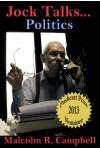 Today's writer's links are brought to you by Jock Talks...Politics, an e-book collection of biting satire that has been nominated for a 2013 Pushcart Prize. The book carries the following warning: Use of this volume while drunk has not been authorized by the Bureau of Alcohol, Tobacco, Firearms and Explosives. It's available on Kindle for only 99 cents.
Today's writer's links are brought to you by Jock Talks...Politics, an e-book collection of biting satire that has been nominated for a 2013 Pushcart Prize. The book carries the following warning: Use of this volume while drunk has not been authorized by the Bureau of Alcohol, Tobacco, Firearms and Explosives. It's available on Kindle for only 99 cents.
Published on September 20, 2012 10:54
September 12, 2012
'Suffering Succotash' reviewed by Jock Stewart
"Suffering Succotash: The Comic Life of Molly Maise," by Lula Mae Barnes (Corn Fritter Press, September 2012), 4,837pp with illustrations, index, maps, and bibliography.
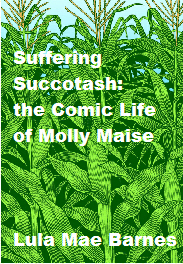 As time goes by, fewer and fewer people remain on this Earth who suffered through depression-era and Thanksgiving meals constructed substantially of succotash.
As time goes by, fewer and fewer people remain on this Earth who suffered through depression-era and Thanksgiving meals constructed substantially of succotash.
"As far back as the Revolutionary War," writes Lula Mae Barnes in her new and overly definitive biography of the 1770s Rhode Island innkeeper, dancer and lady of the evening Molly Maise, "people were thankful to live off succotash when times were hard and just as thankful to get rid of the vile mixture when good fortune smiled upon them again."
Barnes, who spent the last fifty years uncovering the obscure details of the inventor of succotash, claims that the mixture of corn, various forms of beans and minced oaths is far too improbable a concoction to have occurred by accident.
Young Molly Maise, an innkeeper on Aquidneck Island who supported the "divine cause of everything that wasn't British," devised succotash as a "devious treat" for British sailors enjoying her favors in the days leading up to the 1778 Battle of Rhode Island. Ever after, she claimed her succotash made the sailors so ill, they scuttled their own fleet to kill the pain. While historians agree that the fleet was scuttled, they do not cite succotash as a cause.
According to Barnes, Maise spent a lifetime giving humorous talks, some bawdy, about the ills of succotash and the role it had in the war. While her speeches and dance routines, including "The Succotash Rag" (which pre-dated the American Ragtime boom by one hundred years) were well attended, she failed to gain the validation as a soldier and inventor she was seeking.
In fact, the biography's references clearly indict most, if not all, of the United States' founding fathers, soldiers, newspapermen and historians of a "treasonous level of guilt" for their roles in covering up the role of Molly Maise and succotash in "the cause of freedom."
Barnes' epic work clearly shows that every human's recipe for defeat is based on the foods they eat, how they mix them together, and what they name the resulting entree. Had Maise called her corn and beans a Corn & Bean Medley, history might have duly honored her for the suffering her invention caused herself and all the generations that followed.
The epitaph on Maise's tombstone reads: "Loose corn and beans sink ships faster than loose lips."
--Jock Stewart
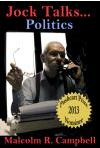 Stewart's "Jock Talks...Politics" has been nominated for a 2013 Pushcart Prize.
Stewart's "Jock Talks...Politics" has been nominated for a 2013 Pushcart Prize.

 As time goes by, fewer and fewer people remain on this Earth who suffered through depression-era and Thanksgiving meals constructed substantially of succotash.
As time goes by, fewer and fewer people remain on this Earth who suffered through depression-era and Thanksgiving meals constructed substantially of succotash."As far back as the Revolutionary War," writes Lula Mae Barnes in her new and overly definitive biography of the 1770s Rhode Island innkeeper, dancer and lady of the evening Molly Maise, "people were thankful to live off succotash when times were hard and just as thankful to get rid of the vile mixture when good fortune smiled upon them again."
Barnes, who spent the last fifty years uncovering the obscure details of the inventor of succotash, claims that the mixture of corn, various forms of beans and minced oaths is far too improbable a concoction to have occurred by accident.
Young Molly Maise, an innkeeper on Aquidneck Island who supported the "divine cause of everything that wasn't British," devised succotash as a "devious treat" for British sailors enjoying her favors in the days leading up to the 1778 Battle of Rhode Island. Ever after, she claimed her succotash made the sailors so ill, they scuttled their own fleet to kill the pain. While historians agree that the fleet was scuttled, they do not cite succotash as a cause.
According to Barnes, Maise spent a lifetime giving humorous talks, some bawdy, about the ills of succotash and the role it had in the war. While her speeches and dance routines, including "The Succotash Rag" (which pre-dated the American Ragtime boom by one hundred years) were well attended, she failed to gain the validation as a soldier and inventor she was seeking.
In fact, the biography's references clearly indict most, if not all, of the United States' founding fathers, soldiers, newspapermen and historians of a "treasonous level of guilt" for their roles in covering up the role of Molly Maise and succotash in "the cause of freedom."
Barnes' epic work clearly shows that every human's recipe for defeat is based on the foods they eat, how they mix them together, and what they name the resulting entree. Had Maise called her corn and beans a Corn & Bean Medley, history might have duly honored her for the suffering her invention caused herself and all the generations that followed.
The epitaph on Maise's tombstone reads: "Loose corn and beans sink ships faster than loose lips."
--Jock Stewart
 Stewart's "Jock Talks...Politics" has been nominated for a 2013 Pushcart Prize.
Stewart's "Jock Talks...Politics" has been nominated for a 2013 Pushcart Prize.
Published on September 12, 2012 13:01
September 6, 2012
Seeing and writing as an act of validation
 The family's house in the 1960s and 1970s.Terri Windling's post Bearing Witness and Patricia Damery's post Goatsong: a Novel served as great catalysts this morning as I continued to wonder what exactly is drawing me back to the Florida Panhandle for a series of short stories.
The family's house in the 1960s and 1970s.Terri Windling's post Bearing Witness and Patricia Damery's post Goatsong: a Novel served as great catalysts this morning as I continued to wonder what exactly is drawing me back to the Florida Panhandle for a series of short stories.I've been working on these stories all year, and at first, they seemed like a simple change of scenery after writing three novels set in Glacier National Park. And then they began to seem, on my 68th birthday, as a mad dash to re-capture the times and places of my childhood.
Both reasons are probably true. Yet, as I read Terri's and Patricia's posts, I thought that as a writer, I needed to see--through my memory and my imagination--a time and a place that fewer and fewer people recall these days and, having witnessed it, write it down in one fictional re-creation after another.
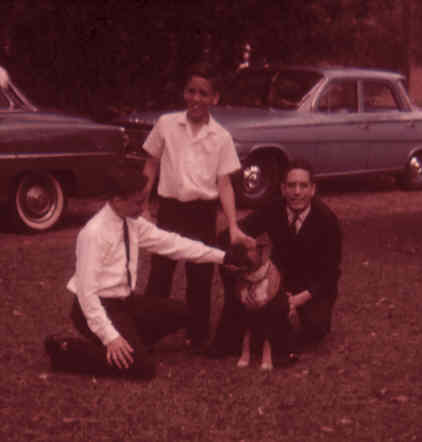 My brothers and I with Lazy.Terri quotes Terry Tempest Williams as saying, "Bearing witness to both the beauty and pain of our world is a task that I want to be part of. As a writer, this is my work. By bearing witness, the story that is told can provide a healing ground. Through the art of language, the art of story, alchemy can occur. And if we choose to turn our backs, we've walked away from what it means to be human."
My brothers and I with Lazy.Terri quotes Terry Tempest Williams as saying, "Bearing witness to both the beauty and pain of our world is a task that I want to be part of. As a writer, this is my work. By bearing witness, the story that is told can provide a healing ground. Through the art of language, the art of story, alchemy can occur. And if we choose to turn our backs, we've walked away from what it means to be human."Needless to say, I have no ready audience for a personal memoir about my life in Tallahassee, Florida between the first grade and my college graduation. Perhaps, then, I can bear witness to bits and pieces of it through my short stories about Tate's Hell Forest, the Florida Caverns State Park, and the St. Marks River. If I do my work well, readers will catch a glimpse of northern Florida, see it through my eyes, and help validate the fact that it was and, in many ways, still is.
In Patricia Damery's new novel Goatsong, to be released later this fall, Ester keeps a record of the things people throw away at a place near her home where people are dumping trash. Damery herself found trash on her walks years ago and began keeping a record of it, a record that ultimately led her to better understand her neighbors.
 With my brothers Doug and BarryIn her post, she writes: "Two characters were born in that moment of unexpected compassion: Dee, who raged in finding what people dumped, often cleaning the piles up, and Ester, an elderly woman who 'logged' the garbage, holding the non-heroic stance that the importance of her logging was to witness."
With my brothers Doug and BarryIn her post, she writes: "Two characters were born in that moment of unexpected compassion: Dee, who raged in finding what people dumped, often cleaning the piles up, and Ester, an elderly woman who 'logged' the garbage, holding the non-heroic stance that the importance of her logging was to witness."For Damery as well as for her character Ester, to witness what was in that trash pile, became a means of seeing and understanding and validating the people--some of them homeless--who were leaving the trash. Until we bear witness to people and places, we will not fully understand them or our relationships with them.
The world is such a cluttered and noisy place, that much of its magic and beauty go unseen because nobody is there to witness it and write it down and tell people about it years into the future. So it is, that I am better understanding the pine flatwoods, blackwater rivers, and swamps of north Florida along with the people who have lived there by telling you about them in my Florida-short-stories in progress.
--Malcolm
Published on September 06, 2012 12:28
September 1, 2012
Glimmer Train Extends Deadline for August Competition
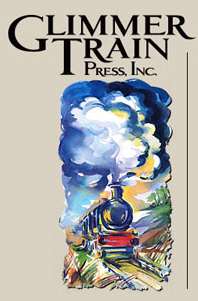 from Glimmer Train: Some writers affected by Hurricane Isaac have asked if we will extend the deadline of the August Short Story Award for New Writers because of power outages and worse. Of course: The deadline for submissions has been moved from August 31 to September 12.
from Glimmer Train: Some writers affected by Hurricane Isaac have asked if we will extend the deadline of the August Short Story Award for New Writers because of power outages and worse. Of course: The deadline for submissions has been moved from August 31 to September 12. The deadline for Glimmer Train's Fiction Open contest for September is September 30th.
You May Also Like: Old Man River, yesterday's post on Malcolm's Round Table.
Have a happy Labor Day Weekend.
Malcolm
Published on September 01, 2012 11:17
August 28, 2012
Stories where we live
"One of the best things about folklore and fairy tales is that the best fantasy is what you find right around the corner, in this world. That's where the old stuff came from." -- Terri Windling
For American audiences, the most famous fairy tales, including those brought to the screen by Disney and others, all came from somewhere else. Such is the power of books and film. Of course, once upon a time, the more famous stories we know were once local yarns from real places.
Almost all places have stories associated with them. You can find some of the more notorious and/or most interesting by running Google searches with such phrases as "Florida ghost stories," "Glacier Park legends," and "Illinois haunted places." The people who live in a town or county often grow up hearing multiple versions of these stories along with others that never get into books, newspapers or websites.
We tell stories to each other almost every day. Sometimes, this is pure gossip. At other times, it's neighborhood news with a bit of opinion thrown into it.
Storytelling is a very natural pasttime even without a front porch or a campfire. We share the good, the bad and the ugly with each other. When that which we're sharing is larger than life, or stranger than normal, it begins turning into a legend associated with the place where we live.
As a writer of contemporary fantasy, I always love weaving local ghost stories and legends into my work. For one thing, those stories are just as much a part of a place as are the rivers, mountains and towns. Also, they have a lot of flavor in them whether it's pure local color or an amusing or frightening tale that could have happened anywhere.
Our stories are stronger, I think, when we consider the legends and tall tales connected to a place as part of our research. Almost every town has a haunted house, cemetery, or lover's lane. If you live there, you know about it already. If you don't, it's not too hard to track down through ghost hunter and haunted [name of town] sites.
Plus, for those of us who love blurring the line between fiction and reality, ghost stories about the places where we've set our short stories and novels add a nice touch of mystery.
Malcolm
For American audiences, the most famous fairy tales, including those brought to the screen by Disney and others, all came from somewhere else. Such is the power of books and film. Of course, once upon a time, the more famous stories we know were once local yarns from real places.
Almost all places have stories associated with them. You can find some of the more notorious and/or most interesting by running Google searches with such phrases as "Florida ghost stories," "Glacier Park legends," and "Illinois haunted places." The people who live in a town or county often grow up hearing multiple versions of these stories along with others that never get into books, newspapers or websites.
We tell stories to each other almost every day. Sometimes, this is pure gossip. At other times, it's neighborhood news with a bit of opinion thrown into it.
Storytelling is a very natural pasttime even without a front porch or a campfire. We share the good, the bad and the ugly with each other. When that which we're sharing is larger than life, or stranger than normal, it begins turning into a legend associated with the place where we live.
As a writer of contemporary fantasy, I always love weaving local ghost stories and legends into my work. For one thing, those stories are just as much a part of a place as are the rivers, mountains and towns. Also, they have a lot of flavor in them whether it's pure local color or an amusing or frightening tale that could have happened anywhere.
Our stories are stronger, I think, when we consider the legends and tall tales connected to a place as part of our research. Almost every town has a haunted house, cemetery, or lover's lane. If you live there, you know about it already. If you don't, it's not too hard to track down through ghost hunter and haunted [name of town] sites.
Plus, for those of us who love blurring the line between fiction and reality, ghost stories about the places where we've set our short stories and novels add a nice touch of mystery.
Malcolm
Published on August 28, 2012 13:28
August 27, 2012
Allerton Park, where 'The Sun Singer' Began
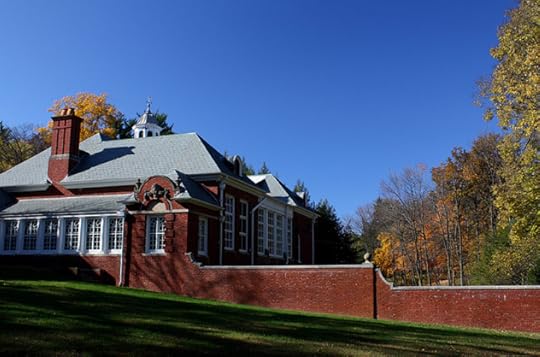 pmschlenker photo on Flickr"On October 14, 1946, Robert Allerton gave to the Board of Trustees of the University of Illinois part of his homestead, 'The Farms,' near Monticello in Piatt County, Illinois, to be used by the University as an educational and research center, as a forest and a wild-life and plant-life preserve, as an example of landscape architecture, and as a public park." - "Robert Allerton Park," U of I brochure, 1951.
pmschlenker photo on Flickr"On October 14, 1946, Robert Allerton gave to the Board of Trustees of the University of Illinois part of his homestead, 'The Farms,' near Monticello in Piatt County, Illinois, to be used by the University as an educational and research center, as a forest and a wild-life and plant-life preserve, as an example of landscape architecture, and as a public park." - "Robert Allerton Park," U of I brochure, 1951.I visited Allerton Park with my parents and grandparents in the early 1950s and, while I liked the woods and trails, I took away stronger memories of the park's unique collection of sculpture placed throughout the grounds. I liked the Garden of the Fu Dogs, the Hidden Goldfish Pond and the Peony Garden. I especially liked the bronze statue of The Sun Singer that sculptor Carl Milles created in 1930. The statue in the park is a replica (created by Milles) of the original Sun Singer in Stockholm.
 broken thoughts photoMilles created the Sun Singer as a memorial to Swedish poet Esaias Tegner and his poem "Song to the Sun." The poem opens with these lines:
broken thoughts photoMilles created the Sun Singer as a memorial to Swedish poet Esaias Tegner and his poem "Song to the Sun." The poem opens with these lines:"I will sing unto the
O thou radianty sun,
High aloft on thy throne
In the deep, azure night,
With worlds left and right
As thy vassals. Below
In thy glance they may glow;
But their light thou must be."
While I have never had an opportunity to return to Allerton Park, my novel The Sun Singer re-creates my long-ago powerful transcendent experience of standing in the meadow next to the statue. The Sun Singer is both an adventure and my song to the sun. It begins in Decatur, Illinois where my grandparents lived, shifts to Allerton Park, and then shifts again to Glacier National Park, Montana. The park is widely known for its scenery and its famous Going to the Sun Road. A perfect place, I thought, for my contemporary fantasy about a young man's dangerous trek into worlds left and right that shine with magic light.
--Malcolm
 Contemporary fantasy for your Kindle
Contemporary fantasy for your Kindle
Published on August 27, 2012 11:54



